|
|
|
Sort Order |
|
|
|
Items / Page
|
|
|
|
|
|
|
| Srl | Item |
| 1 |
ID:
114156
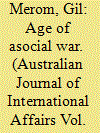

|
|
|
|
|
| Publication |
2012.
|
| Summary/Abstract |
Why, in spite of past failures, do liberal democracies continue to intervene militarily and fight counterinsurgency wars? The answer is grounded in learning. Liberal democracies acknowledge past failures, tracing them to the interaction between the events on the battlefield and society at home. Specifically, they identify the educated middle class and its mix of expedient and altruistic motivations as preventing effective military campaigns and victory. Hence, the main effort of liberal democracies is that they aim to fight wars that are divorced from society. At their disposal are advanced military technology, the professional all-volunteer force, proxies and alliance partners, and private military companies. The desocialising effects of these are complemented by control of the media and thereby the flow of information from the battlefield to society. Liberal democracies have found a way to continue to play the violent game of world politics, but they do so less democratically as they fight asocial wars.
|
|
|
|
|
|
|
|
|
|
|
|
|
|
|
|
| 2 |
ID:
168177


|
|
|
|
|
| Summary/Abstract |
China is expected to become one of the largest markets for prescription drugs in the world and pharmaceutical advertising is becoming increasingly important, particularly in the socially and culturally contested area of mental health. This article briefly explores the background of drug advertising policies in China and the UK and focuses on the distinctive challenges of antidepressant drug regulation. Then, using tools of critical discourse analysis, it examines Chinese antidepressant adverts, and compares them with relevant British adverts. The findings indicate that, relative to the UK, Chinese antidepressant adverts are generally oversimplified, and the critical information concerning the concepts of caution, danger and adverse effects are underrepresented. However, there are many interdependent factors that contribute to the distinctive Chinese antidepressant drug regulatory regime. Hence, Chinese policymakers must maintain a delicate balance between learning from Western regulatory regimes, but also avoiding borrowing too heavily from them.
|
|
|
|
|
|
|
|
|
|
|
|
|
|
|
|
| 3 |
ID:
155807
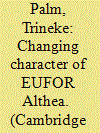

|
|
|
|
|
| Summary/Abstract |
States have different strategic cultures when it comes to legitimating the use of military force and its relation with other foreign policy instruments. However, increasingly, military operations are conducted in multilateral forums; EU military operations are one of the most notable examples of this development. While some claim that these operations reflect power relations between nations with different strategic cultures, others argue that these common missions involve states in a process of collective learning and convergence of interests. Drawing upon an advocacy coalition approach, this paper confronts the competing hypotheses in the case of European Union Force (EUFOR) Althea in Bosnia-Herzegovina (BiH), as the EU’s longest running military operation (since 2004). On the basis of policy documents and semi-structured interviews with policymakers and politicians, this paper concludes that the evolution of EUFOR Althea has been primarily the result of the power politics of different coalitions, but there have also been a few instances of learning.
|
|
|
|
|
|
|
|
|
|
|
|
|
|
|
|
| 4 |
ID:
154857
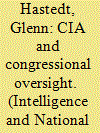

|
|
|
|
|
| Summary/Abstract |
Organizations both learn lessons and forget lessons. A lesson said to be learned by the CIA as a result of the negative reaction of congressional overseers to its interrogation program was the need to create opportunities to provide information and interact with them. The historical record shows that this was a lesson already learned. Why then the need to relearn it? It is suggested here that organizational forgetfulness may be triggered by the same factors which promote learning: perceived problems with organizational performance, opportunities to act, and people.
|
|
|
|
|
|
|
|
|
|
|
|
|
|
|
|
| 5 |
ID:
172170


|
|
|
|
|
| Summary/Abstract |
This paper applies the concept of “communities of practice” to al-Muhajiroun (“the Emigrants”), an outlawed activist network that seeks to create an Islamic caliphate in Britain and the West through activism and proselytizing. Responding to recent studies on terrorism learning and adaptation, the author argues that focusing exclusively on the outputs of learning is unsatisfactory. Instead scholars should analyze learning as a process and unpack the causal mechanisms behind it. To support his within-case analysis, the author draws on extensive field work, including interviews and ethnographic observation. Newcomers to al-Muhajiroun learn the community’s norms and practices through repeated interactions with more experienced activists. These interactions take place in study circles and through companionship. Activists also learn by doing, preaching the Emigrants’ Salafi-Islamist ideology at da’wah stalls and protesting against the West’s “war on Islam” at demonstrations. The more they do, the better they become at performing the network’s high-risk activism, and the more deeply committed they become to its community of practice. However, far from allowing activists to adapt seamlessly to all challenges, the Emigrants’ insular and dogmatic community of practice creates its own problems, hindering its ability to innovate, expand, and thrive in an increasingly hostile environment.
|
|
|
|
|
|
|
|
|
|
|
|
|
|
|
|
| 6 |
ID:
111130
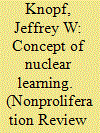

|
|
|
|
|
| Publication |
2012.
|
| Summary/Abstract |
This article seeks to elucidate the concept of nuclear learning. It explores both the "nuclear" and the "learning" aspects of the concept. On the nuclear side, it distinguishes between learning basic facts about nuclear arms and drawing inferences about the larger implications of those facts. On the learning side, it discusses three issues: whether to use the term in a normative or value-neutral manner; the difference between learning that leads to a change in means versus learning that leads to a re-evaluation of ends; and whether learning only takes place at the level of individuals or whether there can also be learning by collective entities. The article argues there is no universal best answer to these questions and that the particular concept of learning that should be employed depends on the goals of the analyst. If the goal is to reduce the chances of nuclear war, however, one type of learning that will be important to consider is whether there is shared, cross-national learning.
|
|
|
|
|
|
|
|
|
|
|
|
|
|
|
|
| 7 |
ID:
190438
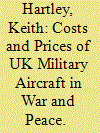

|
|
|
|
|
| Summary/Abstract |
Much of the literature on military aircraft unit costs is based on US data. This article adds to our knowledge by using an original data set for UK military aircraft costs, profits and prices. A distinction is made between unit costs within a generation of aircraft and between generations. Four research questions are addressed. First, is the UK aircraft industry a decreasing cost industry; second, are new entrants higher cost suppliers; third, what is the evidence on profitability in war and peace and between new entrants and original developers; fourth, what is the UK evidence on Augustine-type cost escalation and on the efficiency of aircraft procurement in war and peace? The UK aircraft industry was found to be a decreasing cost industry reflecting both scale and learning economies. Typically, new entrants were higher cost suppliers and profit rates were higher in peace-time. There was substantial Augustine cost escalation for UK combat aircraft and doubts are raised about the efficiency of military aircraft procurement.
|
|
|
|
|
|
|
|
|
|
|
|
|
|
|
|
| 8 |
ID:
147833
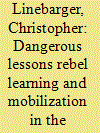

|
|
|
|
|
| Summary/Abstract |
Contemporary research on the international diffusion of civil conflict privileges physical, proximity-based variables like conflict spillover and refugee flows. I argue that the international diffusion of civil strife can occur through a learning mechanism, and that this phenomenon may occur on a worldwide basis. Individuals most likely to rebel, or proto-rebels, may learn about the utility of rebellion before mobilizing and violently challenging the state. Such international learning therefore occurs during the pre-conflict process. International sources by which proto-rebels learn include active, ongoing civil wars, as well as revolutionary governments that have been founded by rebels victorious in past wars. Revolutionary governments radically shock the international system, teaching proto-rebels about the possible benefits to be gained from violently challenging the state. In order to test these assertions, I undertake empirical analyses using militant organization data that capture the year in which rebel movements first emerge, during the period 1968–2001. I then explore the spatial and temporal relationships between rebel movement emergence, civil conflict, and revolutionary regimes, using the country-year as my unit of analysis. I further examine how these relationships are attenuated by cultural and regime-type similarity. I find, in line with the literature, that active civil conflicts generally inspire rebel mobilization only in directly neighboring states, while revolutionary regimes established after rebel victories are associated with mobilization on a global basis. I conclude that proto-rebels learn and take inspiration from some global sources of information, and that significant analytical utility is to be gained by focusing on revolutionary regimes established as a result of rebel victories, as well as mobilization in the pre-conflict process.
|
|
|
|
|
|
|
|
|
|
|
|
|
|
|
|
| 9 |
ID:
180661
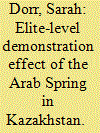

|
|
|
|
|
| Summary/Abstract |
What impact has the ‘Arab Spring’ had upon Kazakhstan's approach to regime security? Short of the possibility of a ‘Central Asian Spring’, if and how the Arab Spring reshaped this authoritarian regime has not been addressed. A longitudinal narrative analysis of Kazakhstan's presidential rhetoric from 2005 to 2015 and fieldwork interviews indicated that the Arab Spring uprisings brought about an elite-level demonstration effect. That is, the regime perceived a heightened threat to its security as a result of instability and regime responses elsewhere, and it sought to shore-up its position and forestall the emergence of local challenges as a consequence of this, whether through discourse, behaviour or policy. This suggests that uprisings elsewhere, including those outside of a state's immediate region, can affect perceptions of regime security in the medium term, despite the absence of domestic unrest at home and a lack of close social and cultural ties between regions.
|
|
|
|
|
|
|
|
|
|
|
|
|
|
|
|
| 10 |
ID:
168216
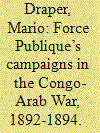

|
|
|
|
|
| Summary/Abstract |
Between 1892 and 1894 the Force Publique of King Leopold II’s Congo Free State engaged in a series of little-known counter-insurgency operations against ivory and slave traders from Zanzibar, commonly referred to as Arabs. Without a particularly strong tradition of imperial service, this article argues that the predominantly Belgian officer corps borrowed and adapted methods used by more experienced colonial forces in the 19th Century. Whether taken from existing literature or learned through experience, it reveals that the Force Publique’s counter-insurgency methods reflected many of the more recognisable aspects of traditional French and British approaches. It suggests that, despite the unique nature of each colonial campaign, basic principles could be adapted by whomsoever to overcome the military and political challenges of colonial conquest. The Force Publique’s campaigns in the Congo-Arab War, therefore, provide further evidence as to how some base theories could be universally applied.
|
|
|
|
|
|
|
|
|
|
|
|
|
|
|
|
| 11 |
ID:
110773
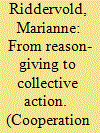

|
|
|
|
|
| Publication |
2011.
|
| Summary/Abstract |
The aim of this article is to contribute to the further development of deliberative theory-to make it more applicable to research on EU integration-by establishing alternative and more concise micro-mechanisms to those of the rationalist bargaining perspectives. It is suggested that the micro-mechanism through which deliberation has an effect on outcomes is what is termed argument-based learning, which means that an actor accepts the validity of a presented argument so that (s)he acts upon it. Moreover, the article differentiates between three types of argument-based learning considered relevant in the EU context. On this basis, it suggests a two-step analytical approach for studies of EU decision-making processes. In trying out the empirical relevance of the framework, it is applied to a case where one would not expect agreements on common EU policies to have been reached due to argument-based learning, namely EU coordination towards the Maritime Labour Convention (MLC). The framework proved helpful in accounting for agreements that are puzzling from a rationalist perspective.
|
|
|
|
|
|
|
|
|
|
|
|
|
|
|
|
| 12 |
ID:
169837
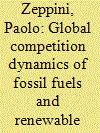

|
|
|
|
|
| Summary/Abstract |
We develop a stochastic decision model to analyse the global competitive dynamics of fossil fuels and renewable energy. It describes coal, oil/gas, solar and wind. These differ not only in pollution intensities but also in profitability and innovation potential. The model accounts for the effect of learning curves, path-dependence and climate policies. Adoption shares endogenously affect agents' utility through increasing returns to adoption, learning, and a ‘peak oil’ capacity constraint. We find that peak oil induces a transition to coal rather than renewable energy, which worsens climate change. By introducing climate policies - such as a carbon tax, market adoption or subsidies for renewables, and eliminating existing subsidies for fossil fuels - we identify potential transition patterns to a low-carbon energy system. Model analysis clarifies two main features of climate policies: which ones solve the climate problem, i.e. do not surpass the critical carbon budget; and how uncertain or variable are final market shares of energy sources.
|
|
|
|
|
|
|
|
|
|
|
|
|
|
|
|
| 13 |
ID:
154463
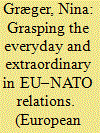

|
|
|
|
|
| Summary/Abstract |
Much scholarly work seeking to explain the EU–NATO relationship emphasises conflicting national or institutional interests, strategic individuals, and operational inefficiencies and overlaps. This article offers an alternative account of how both the everyday and the extraordinary in EU–NATO security cooperation can be identified and analysed by applying practice theory. Despite the “Cyprus issue”, which has left EU–NATO cooperation under Berlin Plus in political stalemate, regular interaction involving civilian and military EU and NATO staff at all levels and various sites has increased over the past decade. The article shows how a practice take is well suited to uncover the practical logic at work in these, predominantly informal EU–NATO encounters; how practices are established, enacted, and also abrupted. Furthermore, it discusses how shared “background conditions” – skills and experience – facilitate practices, learning, and community-building but also competition and rivalry.
|
|
|
|
|
|
|
|
|
|
|
|
|
|
|
|
| 14 |
ID:
109691
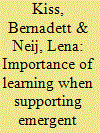

|
|
|
|
|
| Publication |
2011.
|
| Summary/Abstract |
The role of policy instruments to promote the development and diffusion of energy efficient technologies has been repeatedly accentuated in the context of climate change and sustainable development. To better understand the impact of policy instruments and to provide insights into technology change, assessments of various kinds are needed. This study analyzes the introduction and development of energy efficient windows in Sweden and the policy incentives applied to support this process. The study focuses on the assessment of technology and market development of energy efficient windows in Sweden; and by applying the concept of learning, it assesses how conditions for learning-by-searching, learning-by-doing, learning-by-using and learning-by-interacting have been supported by different policies. The results show successful progress in technology development and an improvement in best available technology of Swedish windows from 1.8 W/m2 K in the 1970s to 0.7 W/m2 K in 2010; in the same time period the market share of energy efficient windows increased from 20% in 1970 (average U-value of 2.0 W/m2 K) to 80-85% in 2010 (average U-value of 1.3-1.2 W/m2 K). The assessment shows that various policy instruments have facilitated all four learning processes resulting in the acknowledged slow but successful development of energy efficient windows.
|
|
|
|
|
|
|
|
|
|
|
|
|
|
|
|
| 15 |
ID:
075220
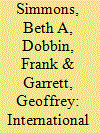

|
|
|
|
|
| Publication |
2006.
|
| Summary/Abstract |
Political scientists, sociologists, and economists have all sought to analyze the spread of economic and political liberalism across countries in recent decades. This article documents this diffusion of liberal policies and politics and proposes four distinct theories to explain how the prior choices of some countries and international actors affect the subsequent behavior of others: coercion, competition, learning, and emulation. These theories are explored empirically in the symposium articles that follow. The goal of the symposium is to bring quite different and often isolated schools of thought into contact and communication with one another, and to define common metrics by which we can judge the utility of the contending approaches to diffusion across different policy domains.
|
|
|
|
|
|
|
|
|
|
|
|
|
|
|
|
| 16 |
ID:
083034


|
|
|
|
|
| Publication |
2008.
|
| Summary/Abstract |
The US military went into Iraq with no clear understanding of or preparations for counterinsurgency. This fact, combined with poor postwar planning and failure to recognize the early development of the insurgency, severely hamstrung the American effort to secure and stabilize the country. Nevertheless, the US Army demonstrated the ability to adapt effectively from the bottom-up at the operational and tactical levels during General George Casey's tenure as commander of Multinational Force-Iraq from 2004 to 2006. Yet despite the success of population-security measures and the development of counterinsurgency doctrine, the military's top leaders in Iraq resisted the implementation of a true population-centric counterinsurgency strategy, opting instead to focus on a 'transition' exit strategy. It was not until after the transition approach collapsed amid the chaos of 2006 that counterinsurgency, and the utility of force in securing the will of the population, was embraced by America's strategic leadership
|
|
|
|
|
|
|
|
|
|
|
|
|
|
|
|
| 17 |
ID:
087430
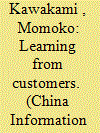

|
|
|
|
|
| Publication |
2009.
|
| Summary/Abstract |
This article explores the firm-level competitive edge that underlies the dominance of Taiwanese manufacturers in the global production of notebook PCs. Based on the study of the business flow of original design manufacturing trade and the author's interviews with outsourcing and subcontracting firms, the article argues that the successful formation of multifaceted capabilities in product development, mass production, and logistics, as well as the creation of information advantages, underpin the drastic rise of Taiwan's position in the global competitive landscape. The article also examines the mechanism through which such firm-level competitiveness has been created, and it argues that the unique attributes of the notebook PC value chains have allowed Taiwanese firms to effectively absorb technology, know-how, and information by interacting with and learning from a wide variety of customers, and thus enhance their competitiveness as original design manufacturing suppliers.
|
|
|
|
|
|
|
|
|
|
|
|
|
|
|
|
| 18 |
ID:
161656
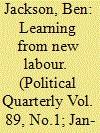

|
|
|
|
|
| Summary/Abstract |
The twentieth anniversary of Labour's 1997 election victory passed without much comment last year—among other reasons, the hectic pace of political developments left little space for historical debate. But two revealing reflections on New Labour's legacy did surface towards the end of 2017. James Graham's play about the recent history of the Labour party, Labour of Love, debuted in London in late September and Gordon Brown's memoir, My Life, Our Times, was published in November.
|
|
|
|
|
|
|
|
|
|
|
|
|
|
|
|
| 19 |
ID:
148252
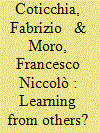

|
|
|
|
|
| Summary/Abstract |
How does military change take place in states that are not able to develop autonomous solutions? How does transformation occur when limited resources are available? What are the “sources of military change” for armed forces that do not possess the (cognitive and material) resources that are essential for autonomous development? In articulating an answer to these questions, this article draws from the theoretical debate on interorganizational learning and looks at the mechanisms that drive “learning from others.” We argue that adaptation and organizational learning often had to look for, and then try and adapt, off-the-shelf solutions that required relatively more limited resources. Empirically, the article focuses on the Italian Armed Forces, which have rarely attracted scholarly attention, although it emerged from almost total lack of activity in the Cold War to extended deployments in the 2000s.
|
|
|
|
|
|
|
|
|
|
|
|
|
|
|
|
| 20 |
ID:
190174
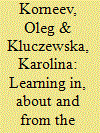

|
|
|
|
|
| Summary/Abstract |
Examining the European Union’s (EU) engagement with Central Asia since the early 1990s, we see an increased commitment to context sensitivity. Arguably, in order to design ‘better’ interventions, the EU needs to know more about this region. This article explores three means of EU learning: in the field – through EU officials’ first-hand experience of working at EU Delegations in Central Asia; about the field – through programmed channels of external expert knowledge, and in particular think tanks; and from the field – during institutionalized consultations with multiple local actors, such as academics, journalists and non-governmental organizations. It is argued that despite this complex learning infrastructure, EU knowledge production on Central Asia has a predominantly performative character. Rather than leading to changes in its relations with Central Asia, new knowledge produced by the EU aims at legitimizing this organization’s pre-existing frameworks of engagement and practices of interactions with the region, and substantiating existing policy priorities.
|
|
|
|
|
|
|
|
|
|
|
|
|
|
|
|
|
|
|
|
|